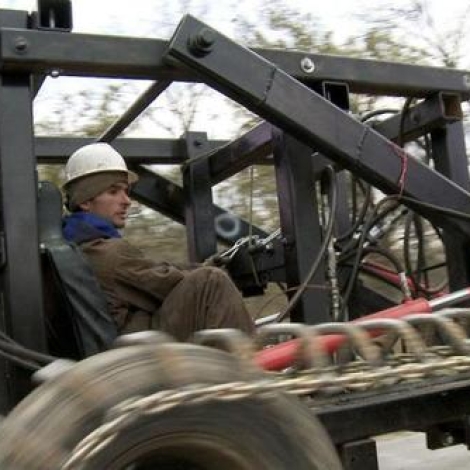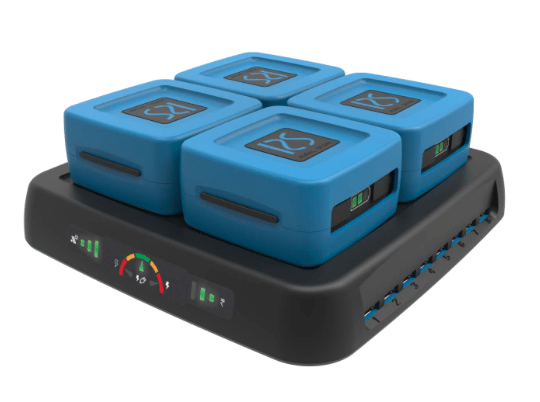On an 18-month journey across the United States, the film producer Ian Midgley met two of America’s most unusual farmers. One, Marcin Jakubowski, lives on a 30-acre farm in northwest Missouri where he prototypes open source farm and construction machinery. The other, Nat Turner, founded an urban farm and high-school equivalency education center around a flooded-out grocery store in the Lower Ninth Ward of New Orleans.
Their unique vision inspired Midgley to weave their separate stories into a documentary called The Spark. Midgley crowd-funded the cost of post production through an Indigogo campaign, which has ended, and he and his colleagues now take donations at the film’s Web site to finish the work. The film is scheduled for release in the spring of 2014, in time for the South by Southwest film festival in Austin, Tex., starting March 7.

Marcin Jakubowski operates one of his open-source machines. Photo courtesy of Christina Heller / The Spark
Two farmers
Marcin Jakubowski, a former physicist, builds machines to lay the foundation for a self-sufficient community in which people make the things that they need without sacrificing the comforts of technology. He calls them the Global Village Construction Set, a collection of 50 machines that can build everything we need to live comfortably on our own without the need to buy anything. Jakubowski founded the Open Source Ecology project where he publishes tested designs online for anyone to use.

Nat Turner educates at-risk teenagers in New Orleans’ Lower Ninth Ward. Photo courtesy of Christina Heller / The Spark
Nat Turner, a former history teacher in Manhattan, drove a biodiesel-powered bus to New Orleans to tutor children in a region that was flooded by Hurricane Katrina. He founded Our School at Blair Grocery to give children in the neighborhood a chance at an education and to escape the drugs and poverty common in the neighborhood. Blair Grocery is a farm, a business and a school where Turner trains high school students in work skills and academic subjects to help them earn their diploma equivalent, called a G.E.D.

Image courtesy of Christina Heller / The Spark
Connecting the dots
We asked Midgley about what to expect in his film, and he responded with excerpts from his writing. These are the highlights.
“Nat and Marcin are part of a cycle of prosperity and healing. By bridging the gap between the two projects in this film and enabling them to work together, we are showing that they are not separate, but part of a single storyline in which technology of one man can provide tools for another, and the education of the latter can empower the people to rise up with these tools,” Midgley says.
On Turner, Midgley says: “Nat Turner changed my life… His radical and creative manner of education is an inspiration to anyone who sees wrongs in the world, but has never felt strong enough to break the cycles of destruction alone. It is not enough to teach a man to fish, we must teach him to think for himself and build community, so he can not only fish, but work with his peers to build solar panels, raise children, and protect his human rights.”
On Jakubowski, Midgley says: “Marcin challenged my ideas of ownership; that ideas are not for profit, but for the betterment of all mankind. If we work together we can do it all ourselves and become connected to our labor and means of sustenance. We do not have to be specialized and therefore disempowered by unhealthy systems.
“This film connects the dots and I hope that it can illustrate to our audience how they can become a part of the cycle of prosperity and escape a future of destruction and competition,” Midgley says.
Supporters can make tax-deductible donations by clicking the link at TheSparkFilm.com.

